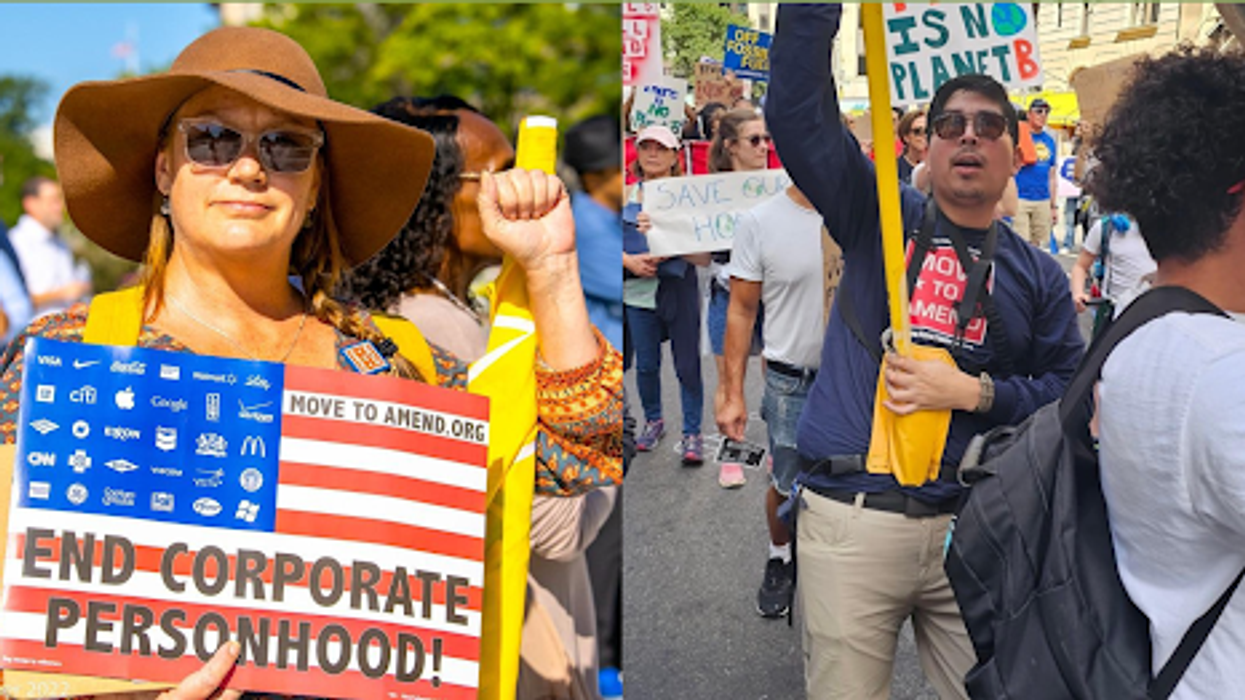Alfonso Saldaña entered political activism during the early years of the Obama administration, motivated by a sense of optimism for real change in healthcare reform, addressing economic inequality, and reducing corporate influence over politics.
“I was excited when he won,” he said. “I thought things were going to get fixed.”
It didn’t take Saldaña long to see how private interests would interfere with the same system issues he thought he was helping fix.
Years later, that reality hit close to home. A powerful explosion at a nearby SpaceX facility in Texas went largely underreported. Saldaña wasn’t surprised.
“They have the money to cover it up,” he said. “That’s what corporate personhood looks like.”
He is now co-director of Move to Amend, a national grassroots coalition formed in 2009 in response to the U.S. Supreme Court’s decision in Citizens United v. FEC. The group advocates for a constitutional amendment that would assert two key principles: that constitutional rights belong only to natural persons, and that political spending is not protected as a form of free speech.
The amendment, known in Congress as House Joint Resolution 54, has garnered more than 60 co-sponsors and has been endorsed by over 800 organizations nationwide. At the local level, over 725 municipalities have passed resolutions in support.
Amend's focus is structural. Rather than pursue campaign finance reforms through statute, the group is working to change the underlying legal framework that enables corporations and other entities to spend unlimited funds in elections.
“I realized that lasting change requires not just electing the right leaders but dismantling the systems that prevent progress,” Saldaña said. “Like corporate personhood and the flood of money in politics.”
His counterpart, co-director Jennie Spanos, came to the movement from a background in journalism. While reporting in northwest Florida during the Deepwater Horizon oil spill, she witnessed firsthand the effects on her own community.
After the Citizens United ruling in 2010, she began volunteering with Move to Amend and later joined the national staff.
“A lot of people don’t recognize or realize that corporations have these alienable rights,” said Sopranos. “A win is when we go into a space that we haven’t been before, and they’ve already started understanding this issue.”
Amend's proposed language differs from other constitutional reform efforts in that it mandates, rather than permits, regulation of political spending. The amendment would also clarify that corporations and other artificial entities do not hold constitutional rights, a position the group argues is necessary to prevent future court rulings that further insulate private power.
Spanos said public support has grown significantly, backed by more than 800 organizational endorsers and over 500,000 petition signers mobilized in support of the amendment.
“Recently, organizations that have come on have not only endorsed the We the People amendment, but they have taken it on as part of their strategic plan to get it passed,” said Spanos.
She pointed to Veterans for Peace, an official endorser that now incorporates the issue of corporate power into its broader advocacy. In 2024, the group partnered with Move to Amend for a Walk to End Corporate Rule, linking their anti-war platform to the effort to confront the outsized influence of corporations in U.S. politics and policy.
While the organization operates with a small staff, it supports a nationwide network of volunteers. It employs a horizontal leadership model and consensus-based decision-making, reflecting the democratic values it seeks to promote.
Although Move to Amend has built momentum at the grassroots level, the group still faces institutional pushback. Spanos cited a court decision in Minnesota that upheld constitutional protections for corporations, even as advocates tried to restrict foreign influence in elections.
“There was a case in Minnesota about foreign spending, and the court said, well, these corporations have constitutional rights,” she said. “That’s why we need this amendment.”
As Move to Amend marks 15 years, its leaders emphasize that the campaign is about more than a single amendment. “It’s about political education and about connecting the dots,” Spanos said. “We’re talking about how power works.”
Both co-directors say the movement’s success depends on long-term public engagement. “It’s a marathon,” Spanos said. “Not a sprint.”
Angeles Ponpa is a graduate student at Northwestern Medill in the Politics, Policy, and Foreign Affairs specialization, and a Fulcrum summer intern.
The Fulcrum is committed to nurturing the next generation of journalists. To learn about the many NextGen initiatives we are leading, click HERE.




















Trump & Hegseth gave Mark Kelly a huge 2028 gift